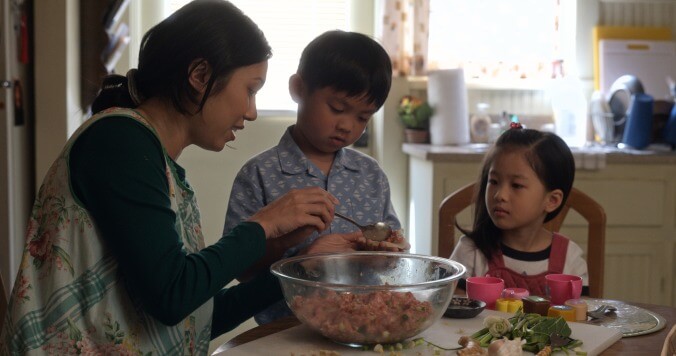The eye-opening Little America is Apple TV+’s best series to date


Apple TV+’s new anthology series, Little America, is an evocative experience. The eight episodes that make up season one are all based on true narratives selected in a series from Epic Magazine and presented, with some alterations, as a gradation of immigrant tales. The show invokes hopefulness and optimism despite the various challenges faced by the characters. Developed by Lee Eisenberg, Kumail Nanjiani, and Emily V. Gordon, every 30-minute episode focuses on a different person overcoming some significant obstacle, whether it’s deportation, visa problems, language gaps, or other cultural clashes. The result is a series of heartfelt stories, as uplifting as they are tearjerking. And, though it’s early, the opening credits are among the most fun and inspired of the year.
In the episode titled “The Cowboy,” Iwegbuna Ikeji (Conphidance) has moved from Nigeria to Norman, Oklahoma, for what he believed would be a few educational years, but the political tension back home forces him to stay longer. He has no choice but to assimilate, keeping a positive outlook of a world that he mostly knows from the movies he watched as a child with his father. In that spirit, he proudly struts around in his newly acquired cowboy hat and boots—when he tips his head to two older women, he appears to fit right in. In another outing called “The Baker,” Beatrice (Kemiyondo Coutinho in a breakout performance) is a single mother with a marine science degree who struggles to make ends meet. Beatrice’s parents wanted her to have the best education, so she moved to the U.S. while the rest of her large family stayed in Uganda. In Lousiville, Kentucky, she ends up continuing her father’s professional journey and opens up a storefront bakery named after her fictional last name called Mukasa’s Cookies—its real-life counterpart, Kizito’s Cookies, is still immensely popular.
Stories of aspiration are increasingly commonplace, but Little America distinguishes them by adding fraught real-life tension mixed with humor and romance, with an emphasis on friendships and family that paints a very wholesome picture of the protagonists’ lives, which don’t solely revolve around the pain or struggles of moving to a new country. In “The Rock,” which was written by Eisenberg, Nanjiani, and Gordon, Iranian first-generation immigrant Faraz (Shaun Toub) is obsessed with building a mansion for his wife and son even though the land he just purchased has a gigantic boulder on top of it. It’s a seemingly bizarre premise, but the focus here is on Faraz’s unstoppable determination, whether it’s building the house or selling quail eggs or befriending everyone at the parking lot where he works. That strong resolve is the vein that runs through all eight episodes, connecting them even as the plots run through different cities, timelines, and cultures.
Little America has arrived at the right time—our current political climate is packed with debates about immigrant rights so it’s important we get to see, even if it’s just on the small screen, the lives of those directly affected by changes in policy. In “The Manager,” a 12-year-old Kabir (Eshan Inamdar) is essentially left to fend for himself and take care of the well-reviewed family motel in Utah when his parents, who are facing deportation, take asylum and head back to India for several years. This circumstance is not a far-fetched idea; it’s the harsh reality for many families across the country. Even episodes that aren’t set entirely in United States take a quiet but determined stand: “The Son,” which is mostly set in Syria and Jordan, does a phenomenal job of demonstrating why some people have no choice but to flee their native countries and seek refuge in America. Rafiq (Haaz Sleiman) is forced to apply for asylum in the U.S. because his own family wants him dead after finding out he’s gay. Little America doesn’t need to explicitly make any big, bold political statements or messages; its heartwarming existence and nuanced storytelling are powerful enough.
All eight episodes have different tones, casts, and directors, which can potentially disrupt the flow of a binge watch (unlike other recent Apple TV+ releases, the complete first season of Little America will be available upon premiere), but ultimately, they don’t derail the larger narrative. Tze Chun directs the best episode of the anthology, “The Grand Prize Expo Winners,” a tale about a Chinese single mother Ai (Angela Lin) trying to connect with her teenage kids on an Alaskan cruise. Lin delivers a wrenching performance, especially in a karaoke scene—Ai’s loneliness is palpable when she realizes her young kids aren’t dependent on her anymore. The direction of Deepa Mehta, Bharat Nelluri, and Sian Heder (who also serves as co-showrunner) is also clear in their respective episodes “The Manager,” “The Cowboy,” and “The Silence,” the last of which is a highly unexpected love story set in a nature retreat. The cast is exceptional in each episode, despite the lack of marquee names found in other Apple TV+ shows like The Morning Show. It’s a joy to watch a television show with actors, writers, and directors who are mostly minorities, who get to tell their stories unabashedly. Little America is eye-opening and worthy of a four-hour binge.